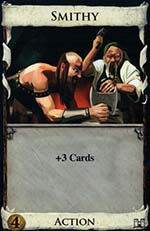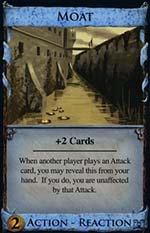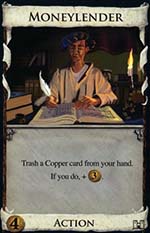


What should we do with Moats/Witches, Smithies and Council Rooms when one does not have any action forks played (+2 Actions such as Villages or Festivals)?

My general rule of thumb is to actually discard the +Cards, though there are some clear exceptions. (There are always exceptions!) For this discussion, I will default to talking about the Smithy as there are clear reasons why one may want Moats (Defense), Witches (Attack), and Council Rooms (Buys).
Let's go into the reason I believe drawing cards as one's last action is typically a bad play.
There is a risk of drawing and discarding actions that will not be able to be used until the next shuffle. When one plays a draw card as their last action, the only cards that can help them are treasure cards (henceforth will be noted as gold or money).
If that player draws gold, no damage has been done short of potentially damaging a future turn (with the trade-off of making the current turn "successful").
If that player draws victory points, the outcome is likely not ideal, but a positive nonetheless.
However if action cards are drawn, they are completely wasted. The deck has been stripped of useful cards and the player must wait until at least the next shuffle to be able to play those actions.

So why is having to discard an action bad? Let's suppose on the initial shuffle you and your opponent both buy a Moneylender, but you were unfortunate and had to wait until after the second shuffle to use the Moneylender while your opponent used it after their first shuffle.
Who has the advantage? The quantified power of one's deck can be somewhat simplified to the gold spent on its cards plus the number of real actions that have been played (think Chapel, Moneylender, Remodel, Feast, Workshop).
By playing a Smithy to draw a Moneylender, that player will have lost tempo by having to wait another shuffle into the game to be able to utilize the Moneylender.

Now there are also some obvious examples when a player would definitely want to bend/break this rule. The first one that comes to mind is if a player buys a Smithy and Silver on their first shuffle. Then (provided playing Smithy won't require to shuffle in a recently bought action card), there's no fear of drawing a useless card.
The more general application of this is when one counts their action cards remaining in their deck and knows that the probability is slim to none of drawing an action card.
The other somewhat obvious rule is if the end of the game is near and you're close to purchasing that last Province for the win. It's certainly worth potentially sacrificing a useful card if it closes the game in your favor, or if it's highly unlikely you'll get another turn due to someone else being able to finish the game.
So before you just play that Smithy as your last action, think about it for a second and ask yourself if it is really necessary!
Continue Reading


